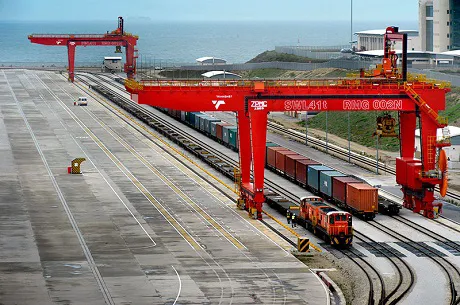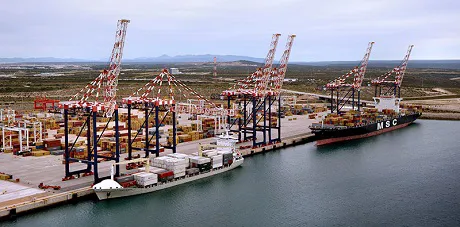Strikes, equipment failure and maintenance backlogs, low productivity levels, low staffing levels, violence against truck drivers – everything that could go wrong logistically, seemingly did go wrong this year during South Africa’s citrus export season.
Towards the end of the citrus season, the Citrus Growers’ Association concluded that the disruptions to shipping programmes had resulted in massive losses. “It has put South Africa, as a reliable supplying country, on the back foot.”
 Ngqura Container Terminal (photo: Transnet Port Terminals)
Ngqura Container Terminal (photo: Transnet Port Terminals)
In May FreshPlaza reported on the situation in Durban which already appeared "pretty awful", on truck drivers waiting for twelve hours to enter Bayhead Road at Durban Harbour. Access into the harbour is not fit for purpose and on its own causes more congestion than necessary (both petroleum tankers and trucks carrying fresh produce have to share the entrance). There was coldstore congestion, missing stack dates, poor productivity levels – and the citrus season hadn’t even entered its peak yet.
At Durban a logistics expert called ship-to-shore and crane move rates “abysmal”.
Then things started going wrong in the Eastern Cape. Wind had blown a crane into the sea at Port Elizabeth Harbour some months before the start of citrus season and when a second crane malfunctioned in July, operations basically ground to a halt. The main Europe service was diverted from Port Elizabeth to Ngqura, compounding the pressure on, for instance, plug points at the latter harbour.
In an effort to avoid both those harbours, Eastern Cape producers diverted approximately 20% of the usual volumes that would’ve left through Eastern Cape ports to Durban and Cape Town, and it came at a stiff cost. The CGA estimates that producers and exporters had to spend an extra R44 million (2.7 million euros) in transport costs and other logistics to move 57,000 pallets away from the Eastern Cape.
This also caused a shortage of containers and hauliers.
“Every day I have to put out fires,” an irate exporter told FreshPlaza at the time.
 Ngqura Container Terminal (photo: Transnet Port Terminals)
Ngqura Container Terminal (photo: Transnet Port Terminals)
Navels from Senwes were down, which cleared some space for the additional Eastern Cape volumes in Durban. (The industry expects that drought in parts of Limpopo will next year also relieve pressure from Durban, but the overall estimation is that there will come 500,000 tonnes more citrus from South Africa over the next three years.)
In July the Citrus Growers’ Association’s logistics development manager noted that the biggest challenge from a shipper’s point of view was the delay in ship berthing. It meant that containers that needed to be packed for specific vessels are delayed, and likewise for importers. “We are seeing berthing delays at Ngqura Container Terminal of up to seven days and vessel working days averaging four days, where it should normally be 48 hours.”
There are of course other losses as well, in terms of shelf life and quality, and these are more difficult to quantify but probably no less substantial.
FreshPlaza was told of containers missing reduced stack dates, waiting landside for even weeks as shipping lines attempted to maintain schedule integrity through skipping harbours and coldstores were overflowing with stock that wasn’t moving.
One exporter said that he was spending a third more of his working day just on logistics, and many others confirmed that negotiating around the crisis at the harbours was taking a toll.
The citrus industry says it is cautiously optimistic for the coming, having received assurances from Transnet that this year would not recur.
New management at Transnet has been sifting through dubious transactions concluded at the company during the reign of Jacob Zuma. The lucrative procurement function, which has been a major vehicle of enrichment, has been devolved to the national Treasury, with the concomitant effect that procurement processes are very slow and hamper equipment purchases and maintenance.
Management at state company Transnet has been blamed for the continual low productivity levels – still continuing at this point – as well as a controversial bonus scheme which has still not been put to bed, which is a source of ongoing concern for the fruit industry.
